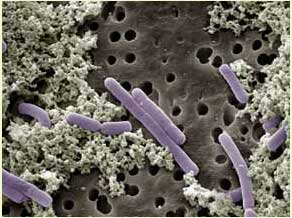Scientists from New York University have discovered certain types of bacteria in the mouths of pregnant mothers that are linked to preterm birth and low birth weight in newborns.
 |
Lactobacillus casei Bacteria |
The scientists conducted a study to determine the bacterial count in the saliva of 297 women in their third trimester of pregnancy. They identified two types of bacteria:
The first type, associated with preterm birth, is called Actinomyces naeslundii Genospecies2 (A. naeslundii gsp2).
The second type, which was present in larger quantities and affected the baby’s weight, is known as Lactobacillus casei (L. casei).
Dr. Ananda P. Dasanayake from the Department of Epidemiology and Public Health at New York University stated:
“The impact of A. naeslundii gsp2 on preterm birth and newborn weight aligns perfectly with previous theories suggesting that pathogenic bacteria in the mouth and certain molecules produced by the body to combat these bacteria can enter the bloodstream and affect the birthing process.
Meanwhile, L. casei produces acid that helps maintain the pH level in the uterus at 4.5, which inhibits the growth of other bacteria, including those related to bacterial vaginosis associated with preterm birth.”
Dr. Vincent J. Iacono added: “Interestingly, this study has precisely identified that if the number of A. naeslundii gsp2 bacteria increases by tenfold, the weight of the fetus will decrease by 60 grams, and the gestational age will decrease by 0.17 weeks. Conversely, if the count of L. casei increases by one unit, the fetal weight increases by 42 grams, and the gestational age increases by 0.13 weeks.”
Future research will delve deeper into oral bacteria and other types of bacteria not related to oral diseases to better understand the close relationship between oral hygiene conditions and preterm birth.
Additionally, a study published in the Journal of Periodontology discusses the impact of oral diseases on preterm birth and low birth weight in infants.
The findings suggest that pregnant women with oral diseases have a higher risk of preterm birth. Scientists recommend that women pay more attention to oral hygiene during pregnancy.




















































